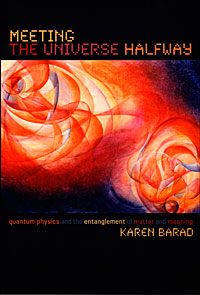"When myth incarnates in the waking world...”
Karen Michelle Barad

Argential Realism
Argential Realism is a theory developed by American feminist theorist, Karen Michelle Barad, author of Meeting the Universe Halfway: Quantum Physics and the Entanglement of Matter and Meaning. Professor Barad earned her doctorate in theoretical physics at Stony Brook University and is the Professor of Feminist Studies, Philosophy, and History of Consciousness at the University of California, Santa Cruz.
"According to Barad's theory of agential realism, the universe comprises phenomena, which are "the ontological inseparability of intra-acting agencies". Intra-action, a neologism introduced by Barad, signals an important challenge to individualist metaphysics. For Barad, phenomena or objects do not precede their interaction, rather, 'objects' emerge through particular intra-actions. Thus, apparatuses, which produce phenomena, are not assemblages of humans and nonhumans (as in actor-network theory). Rather, they are the condition of possibility of 'humans' and 'non-humans', not merely as ideational concepts, but in their materiality. Apparatuses are 'material-discursive' in that they produce determinate meanings and material beings while simultaneously excluding the production of others. What it means to matter is therefore always material-discursive. Barad takes her inspiration from physicist Niels Bohr, one of the founders of quantum physics. Barad's agential realism is at once an epistemology (theory of knowing), an ontology (theory of being), and an ethics. For this, Barad employs the term onto-epistemology. Because specific practices of mattering have ethical consequences, excluding other kinds of mattering, onto-epistemological practices are always in turn onto-ethico-epistemological."n
Wikipedia contributors. "Karen Barad." Wikipedia, The Free Encyclopedia. Wikipedia, The Free Encyclopedia, 4 Jan. 2018. Web. 28 Jan. 2018. https://en.wikipedia.org/wiki/Karen_Barad
Links
Meeting the Universe Halfway: Quantum Physics and the Entanglement of Matter and Meaning
Professor Barad's personal page at the University of California, Santa Cruz